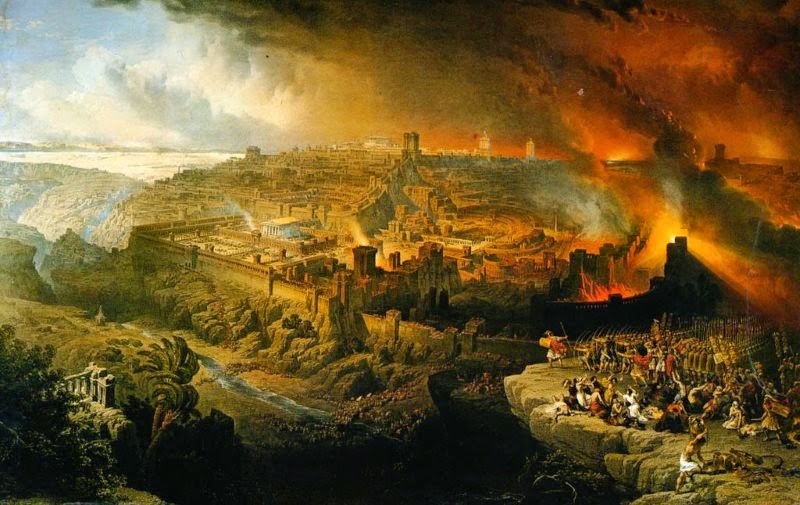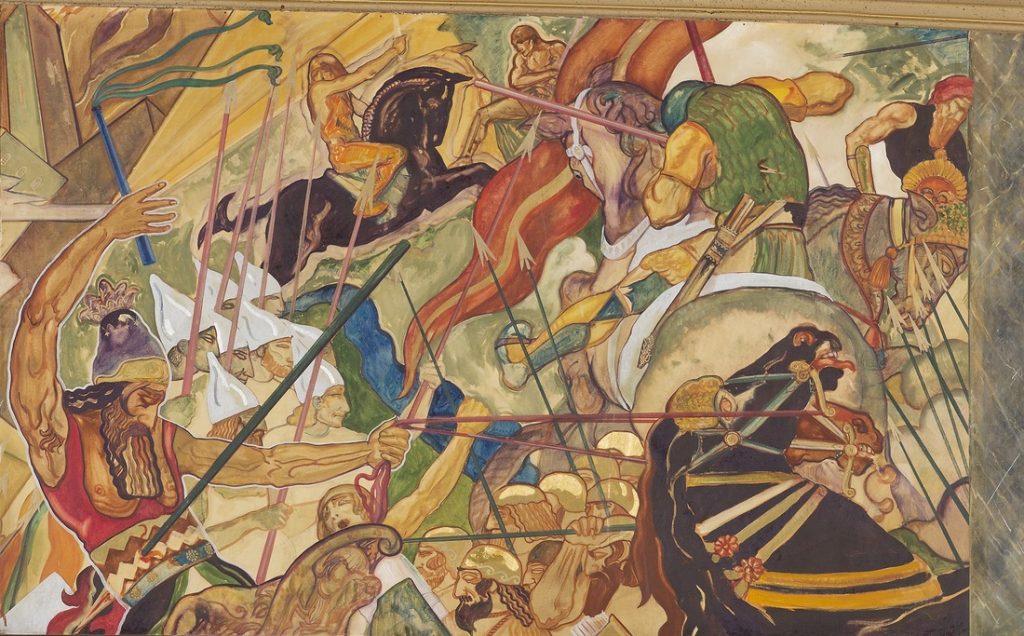While reading Jeremiah, I realized that the theme of captivity and deliverance is pervasive in the scriptures. In fact, throughout life — in a way, we are captive here on this mortal earth we call the telestial kingdom. Death is not deliverance, in case you were thinking that. Christ delivers us through his atonement. There are many examples of “being captive” and “being delivered.” It is the law of opposition in all things.
Jeremiah’s message of captivity and deliverance
Jeremiah prophecies that Babylon will invade Jerusalem and take many of its inhabitants captive. He explains that shall die, not be buried but be like dung on the earth — not a happy scene:
They shall die of grievous deaths; they shall not be lamented; neither shall they be buried; but they shall be as dung upon the face of the earth: and they shall be consumed by the sword, and by famine; and their carcases shall be meat for the fowls of heaven, and for the beasts of the earth. (Jeremiah 16)
The people didn’t really want to hear this because Jeremiah also provided a solution to the problem: repent and return to the Lord. The people of Jerusalem thought they were doing just fine.
And it shall come to pass, (notice that phrase that is so often used in The Book of Mormon) when thou shalt shew this people all these words, and they shall say unto thee, Wherefore hath the Lord pronounced all this great evil against us? or what is our iniquity? or what is our sin that we have committed against the Lord our God? (Jeremiah 16)
I find it interesting that Jeremiah and Lehi (of the Book of Mormon) were contemporaries – living in Jerusalem about 600 B.C. Both of them warned the people of coming captivity and destruction if they did not repent and return to the Lord. And what was their great sin?
What brings down the wrath of God? Why do they get destroyed and led away captive to another nation?
The Lord tells Jeremiah exactly what to say to the people:
Then shalt thou say unto them, Because your fathers have forsaken me, saith the Lord, and have walked after other gods, and have served them, and have worshipped them, and have forsaken me, and have not kept my law;
And ye have done worse than your fathers; for, behold, ye walk every one after the imagination of his evil heart, that they may not hearken unto me:
Therefore will I cast you out of this land into a land that ye know not, neither ye nor your fathers; and there shall ye serve other gods day and night; where I will not shew you favour. (Jeremiah 16)
Deliverance:
Jeremiah is not all doom and gloom, though. He prophecies of a coming day when the captive will return. The tribes of Israel will be scattered for a long, long time, but in “that day,” the last days, the latter days, Jeremiah foretells that the Gentiles will bring them back to their homeland.
Therefore fear thou not, O my servant Jacob, saith the Lord; neither be dismayed, O Israel: for, lo, I will save thee from afar, and thy seed from the land of their captivity; and Jacob shall return, and shall be in rest, and be quiet, and none shall make him afraid.
For I am with thee, saith the Lord, to save thee: though I make a full end of all nations whither I have scattered thee, yet will I not make a full end of thee: but I will correct thee in measure, and will not leave thee altogether unpunished.
Therefore all they that devour thee shall be devoured; and all thine adversaries, every one of them, shall go into captivity; and they that spoil thee shall be a spoil, and all that prey upon thee will I give for a prey.
For I will restore health unto thee, and I will heal thee of thy wounds, saith the Lord; because they called thee an Outcast, saying, This is Zion, whom no man seeketh after. (Jeremiah 30)
And, actually, there are some people in Jerusalem during Jeremiah’s time that are delivered instead of taken captive. This was the case with Lehi and his family. And then there was Mulek too.
Nephi sees captivity and deliverance.
Nephi has a lot of experience with the captivity/deliverance theme. His father, Lehi, shares a dream about Jerusalem being destroyed and taken captive, and then Nephi has the same dream/vision. But not only that, his brothers often bind him (captive), and then the Lord delivers Nephi by breaking the cords. So we see a macro example of this theme as well as a micro example.
Nephi becomes a visionary man like his father and sees when the Lord delivers the Gentiles in Europe (under a type of captivity) to a Promised Land. Nephi’s people (once delivered by the Lord) are taken captive or killed by the Gentiles. This is the account of the “Pilgrims” who ventured here on ships such as the Mayflower. I know this is an unpopular theme when the white man came to America and brought sickness to the “indigenous people.” But it seems to be part of God’s theme of what happens to a people when they abandon his teachings.
And I looked and beheld a man among the Gentiles, who was separated from the seed of my brethren by the many waters; and I beheld the Spirit of God, that it came down and wrought upon the man; and he went forth upon the many waters, even unto the seed of my brethren, who were in the promised land.
…I beheld the Spirit of God, that it wrought upon other Gentiles; and they went forth out of captivity, upon the many waters.
… I beheld many multitudes of the Gentiles upon the land of promise; and I beheld the wrath of God, that it was upon the seed of my brethren; and they were scattered before the Gentiles and were smitten. And I, Nephi, beheld that the Gentiles that had gone out of captivity were delivered by the power of God out of the hands of all other nations. (1 Nephi 13:12-19)
Joseph Smith’s warning of captivity and deliverance
The Lord revealed the preface to the Book of Commandments (now called the Doctrine & Covenants) to Joseph Smith on November 1, 1831. In a special conference of the elders of the church in Hiram, Ohio, Joseph discussed compiling the many revelations he had already received into a published book form.
This preface is similar to the warnings from the prophets of the Old Testament, New Testament, and Book of Mormon. Through the latter-day prophet, Joseph, the Lord warns of captivity and deliverance.
Prepare ye, prepare ye for that which is to come, for the Lord is nigh; And the anger of the Lord is kindled, and his sword is bathed in heaven, and it shall fall upon the inhabitants of the earth.
And the arm of the Lord shall be revealed; and the day cometh that they who will not hear the voice of the Lord, neither the voice of his servants, neither give heed to the words of the prophets and apostles, shall be cut off from among the people;
For they have strayed from mine ordinances, and have broken mine everlasting covenant;
They seek not the Lord to establish his righteousness, but every man walketh in his own way, and after the image of his own god, whose image is in the likeness of the world, and whose substance is that of an idol, which waxeth old and shall perish in Babylon, even Babylon the great, which shall fall.
Wherefore, I the Lord, knowing the calamity which should come upon the inhabitants of the earth, called upon my servant Joseph Smith, Jun., and spake unto him from heaven, and gave him commandments; And also gave commandments to others, that they should proclaim these things unto the world; and all this that it might be fulfilled, which was written by the prophets- (D&C 1)
What must we do to be delivered?
With the voices of warning throughout history, they also give us a way to be delivered by the Lord. True, some captivity is part of this mortal life, but not everyone is delivered from destruction. If we read what the prophets say, we can identify who is delivered and why.
Sabbath Day Observance
Jeremiah explains that his people in Jerusalem have forgotten their true God — they are not keeping the Sabbath.
Thus saith the Lord; Take heed to yourselves, and bear no burden on the sabbath day, nor bring it in by the gates of Jerusalem; Neither carry forth a burden out of your houses on the sabbath day, neither do ye any work, but hallow ye the sabbath day, as I commanded your fathers.
But if ye will not hearken unto me to hallow the sabbath day, and not to bear a burden, even entering in at the gates of Jerusalem on the sabbath day; then will I kindle a fire in the gates thereof, and it shall devour the palaces of Jerusalem, and it shall not be quenched. (Jeremiah 17)
Repent
And it’s not like the Lord doesn’t give you a hint about what you need to do for Him to deliver you. Yea, repentance. But repenting is not a favorite topic. Jeremiah continues with his word from the Lord:
“Now therefore say to the people of Judah and those living in Jerusalem, ‘This is what the Lord says: Look! I am preparing a disaster for you and devising a plan against you. So turn from your evil ways, each one of you, and reform your ways and your actions.’
But they will reply, ‘It’s no use. We will continue with our own plans; we will all follow the stubbornness of our evil hearts.’ ” (Jeremiah 18)
If you look throughout the scriptures, you will find the Lord’s admonition to repent. But our hearts become hardened, our ears hard of hearing, our eyes blind. It even reminds me of a Woody Allen movie scene in Annie Hall, when the camera zooms in on the two separate family gatherings — they talk about how they will be spending the holidays:
I guess that is a common thread throughout history — the people become so blind that they do not recognize their sins and thus have no way of finding their way back to God. I won’t list all the scripture references where prophets have warned the people to repent. There are many. In our own day, President Nelson has re-emphasized the importance of keeping the Sabbath Day.
I heard a speaker at stake conference talk about this new focus on the Sabbath day — which for her family included watching sports on Sunday. Everyone has their own interpretation. And I think that is fine because we are now at that point in the timeline of the world that we need to seek the Lord individually. Like Nephi did, his brothers did not have faith in the Lord’s deliverance because they did not inquire of the Lord. Instead, they just said,
Behold, we cannot understand the words which our father hath spoken concerning the natural branches of the olive tree, and also concerning the Gentiles.
And I said unto them: Have ye inquired of the Lord?
And they said unto me: We have not; for the Lord maketh no such thing known unto us. (1 Nephi 15:7-11 )
Original post Nov 2018, updated May 2021.



